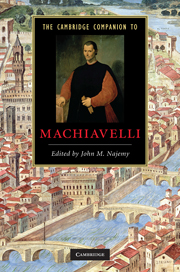Book contents
- Frontmatter
- Introduction
- 1 Niccolò Machiavelli: a portrait
- 2 Machiavelli in the chancery
- 3 Machiavelli, Piero Soderini, and the republic of 1494-1512
- 4 Machiavelli and the Medici
- 5 Machiavelli’s Prince in the epic tradition
- 6 Society, class, and state in Machiavelli’s Discourses on Livy
- 7 Machiavelli’s military project and the Art of War
- 8 Machiavelli’s Florentine Histories
- 9 Machiavelli and Rome: the republic as ideal and as history
- 10 Philosophy and religion in Machiavelli
- 11 Rhetoric and ethics in Machiavelli
- 12 Machiavelli and poetry
- 13 Comedian, tragedian: Machiavelli and traditions of Renaissance theater
- 14 Machiavelli and gender
- 15 Machiavelli’s afterlife and reputation to the eighteenth century
- 16 Machiavelli in political thought from the age of revolutions to the present
- Index
1 - Niccolò Machiavelli: a portrait
Published online by Cambridge University Press: 28 September 2010
- Frontmatter
- Introduction
- 1 Niccolò Machiavelli: a portrait
- 2 Machiavelli in the chancery
- 3 Machiavelli, Piero Soderini, and the republic of 1494-1512
- 4 Machiavelli and the Medici
- 5 Machiavelli’s Prince in the epic tradition
- 6 Society, class, and state in Machiavelli’s Discourses on Livy
- 7 Machiavelli’s military project and the Art of War
- 8 Machiavelli’s Florentine Histories
- 9 Machiavelli and Rome: the republic as ideal and as history
- 10 Philosophy and religion in Machiavelli
- 11 Rhetoric and ethics in Machiavelli
- 12 Machiavelli and poetry
- 13 Comedian, tragedian: Machiavelli and traditions of Renaissance theater
- 14 Machiavelli and gender
- 15 Machiavelli’s afterlife and reputation to the eighteenth century
- 16 Machiavelli in political thought from the age of revolutions to the present
- Index
Summary
Machiavelli's grandson Giuliano de' Ricci, who devoted much of his life to gathering, preserving, and copying his grandfather's papers, tells a perhaps apocryphal story that reveals how Machiavelli's contemporaries understood his personality and unconventional attitudes. In 1504, four years after Machiavelli's father died, a friar at the Franciscan church of Santa Croce, where the family chapel was located, informed Machiavelli that some bodies of persons not from the family had been illegally buried there and that he ought to have them removed. But Machiavelli told the friar, “Well, let them be, for my father was a great lover of conversation, and the more there are to keep him company, the better pleased he will be.” The kernel of truth in this story lies in Machiavelli's gratitude to his father for passing on an enjoyment of conversation and initiating him into the world of writers, and also in Machiavelli's penchant for viewing things with a slant frequently at odds with propriety. Indeed, the pragmatism and sly, ironic wit that characterize his response to the friar appear repeatedly in his writings. The anecdote underscores the significance that “conversation” had for a man who delighted in talking to and questioning people and books and enjoyed an easy familiarity with them. His love of friendship, dialogue (even imagined ones), and irony, frequently leavened with a mischievous and mocking wit, never left him (not even, as another legend has it, on his deathbed).
- Type
- Chapter
- Information
- The Cambridge Companion to Machiavelli , pp. 14 - 30Publisher: Cambridge University PressPrint publication year: 2010
- 5
- Cited by

